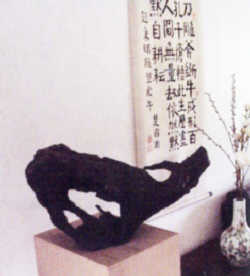 Xiong was also a poet of the sentimental school. His poems are works of nostalgia typical of traditional Chinese poets. Meanwhile, they are the wise reflections of a unique philosopher-artist.
Xiong was also a poet of the sentimental school. His poems are works of nostalgia typical of traditional Chinese poets. Meanwhile, they are the wise reflections of a unique philosopher-artist.
"When I taught Chinese, in order to make my philosophical thinking understood to my students, I tried to use the plainest words possible in my lectures. Those words turned into my first poems," he said. Plain as they were, Xiong's poems have a lingering charm laced with remembrances of things past. From his poems, one can feel his passion for his motherland and his eagerness to return to his hometown.
In 1965, a Chinese artist who just arrived in Paris asked Xiong how he felt about being in France for 20 years. Xiong replied: "I am a seed born from Chinese culture but growing on Western land.
I don't know what kind of flower I will blossom into - red, purple or gray, or what kind of fruits I will yield - sweet, sour or bitter. In the end of my life, I have to show my fruits to my friends. But I am neither proud nor ashamed."
As a "seed born from Chinese culture", Xiong put his roots deep into French soil and grew into a flourishing tree. This tree, fused with the culture of his motherland, has fueled Xiong's artistic vision throughout his life. Six months before he died, Xiong said: "In the new century, Chinese scholars' sense of concern and responsibility have changed to focus on new orientations, because the time of being bullied has long passed and Chinese people have not only stood up but also stood at the forefront of world cultural development. But the one thing that remains unchanged is the spirit that Chinese scholars have cherished throughout history: Be the first to bear hardship and the last to enjoy comfort."
(Author: Yu Xi)
